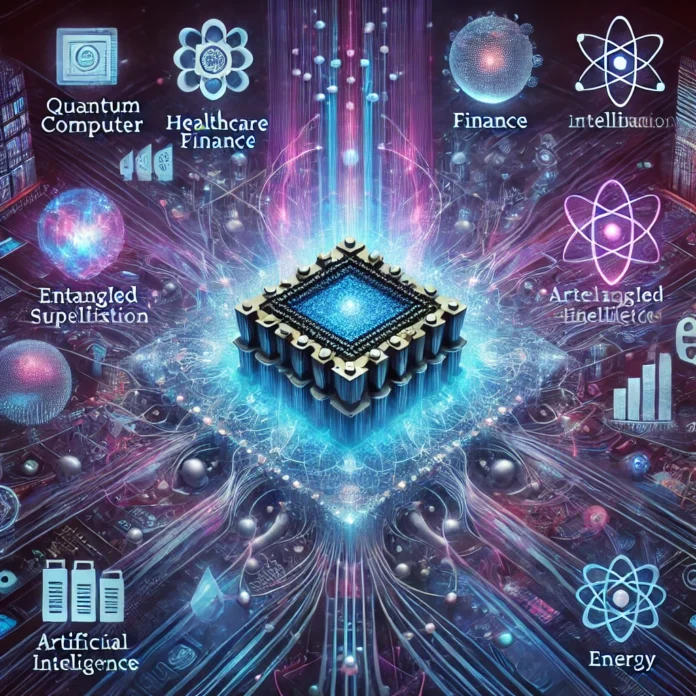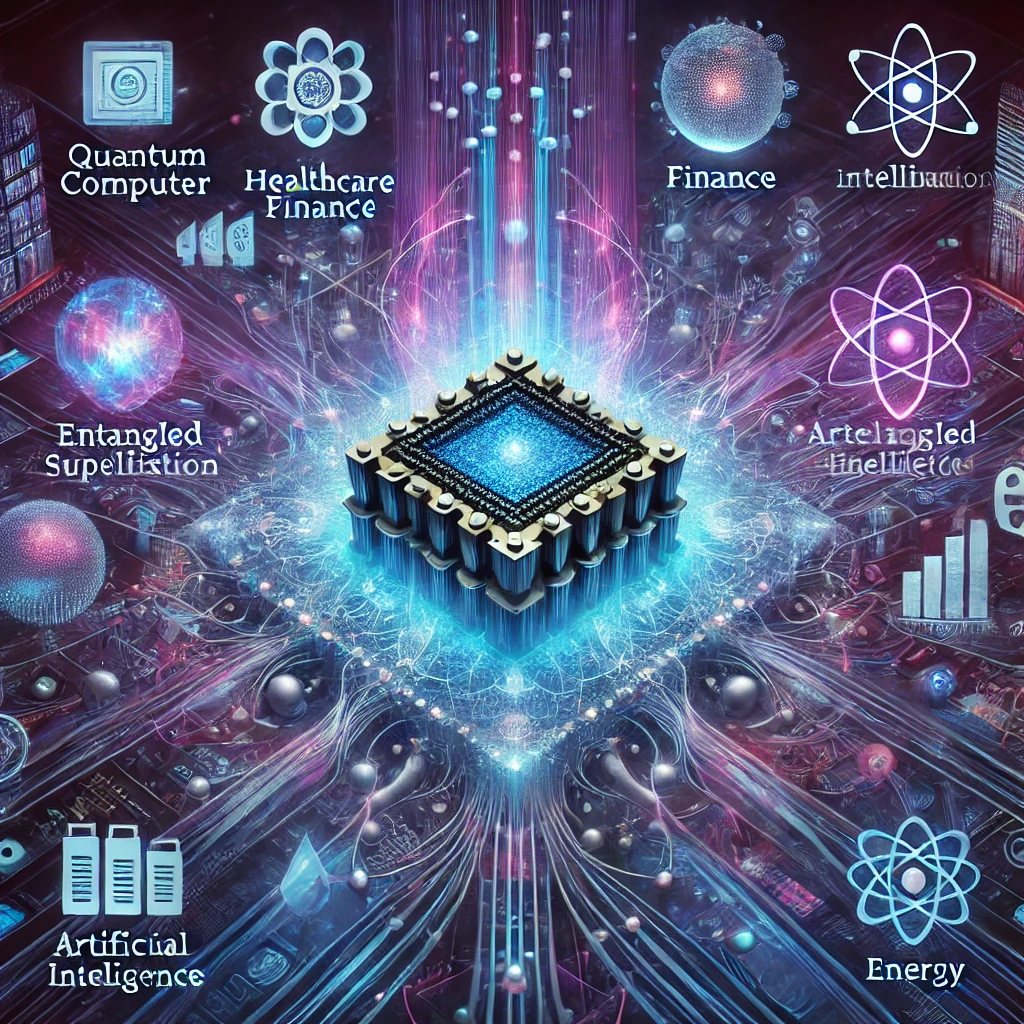
Quantum computing has long been considered one of the most exciting and transformative frontiers in technology. While classical computers rely on binary digits (bits) that represent either 0 or 1, quantum computers leverage the principles of quantum mechanics to perform calculations in entirely new ways, offering the potential to solve complex problems that are beyond the reach of classical computers. As breakthroughs continue to emerge, quantum computing is poised to revolutionize industries ranging from cryptography and pharmaceuticals to finance and materials science.
This article explores the recent advances in quantum computing, the fundamental differences between classical and quantum computing, and its far-reaching potential applications across various industries.
Understanding Quantum Computing: Key Concepts
Before diving into recent breakthroughs and applications, it is essential to understand the unique principles that distinguish quantum computing from classical computing.
- Quantum Bits (Qubits): In classical computing, data is processed using bits, which can be either 0 or 1. In quantum computing, the fundamental unit of information is the qubit. Unlike a classical bit, a qubit can exist in a superposition of both 0 and 1 simultaneously, thanks to quantum mechanics. This allows quantum computers to process much more information at once.
- Superposition: Superposition allows qubits to represent multiple states simultaneously. This is what gives quantum computers the potential to perform complex computations exponentially faster than classical computers.
- Entanglement: Quantum entanglement is a phenomenon where two qubits become linked, such that the state of one qubit is directly related to the state of another, regardless of the distance between them. This property can be leveraged to solve complex problems more efficiently than classical systems.
- Quantum Interference: Quantum computers can use interference to amplify correct solutions and cancel out incorrect ones during computations, which can lead to more accurate results in solving complex problems.
While still in its early stages, quantum computing has seen remarkable breakthroughs in recent years, with companies and research institutions making significant strides toward practical applications.
Recent Breakthroughs in Quantum Computing
1. Quantum Supremacy
In 2019, Google claimed to have achieved quantum supremacy, a milestone that refers to a quantum computer performing a calculation that would be practically impossible for a classical computer to solve. Google’s quantum processor, named Sycamore, solved a problem in 200 seconds that, according to their estimates, would take the world’s most powerful supercomputer approximately 10,000 years to solve.
While there has been some debate about the real-world implications of this specific calculation, the achievement demonstrated the growing potential of quantum computers and highlighted the power of quantum processors in solving certain types of problems.
2. IBM’s Quantum Roadmap
IBM has been a leader in quantum computing development and has made several breakthroughs in recent years. In 2021, the company unveiled its Eagle quantum processor, which has 127 qubits. This marked a significant advancement in the number of qubits that could be handled in a single quantum system.
IBM also laid out an ambitious roadmap for building even more powerful quantum processors, with plans to develop a 1,121-qubit processor called Condor by 2023 and eventually scale quantum systems to a million qubits in the future.
3. Quantum Error Correction
One of the major challenges in quantum computing is quantum error correction. Due to the sensitivity of qubits to environmental noise and interference, quantum computers are prone to errors during calculations. Researchers have made considerable progress in developing techniques for error correction, which will be crucial for building scalable and reliable quantum computers.
In 2021, researchers at the University of Sydney demonstrated a quantum error-correction technique that significantly improved the reliability of quantum operations. These advancements are critical for achieving fault-tolerant quantum computing, a necessary step for practical and large-scale applications.
4. Quantum Networking
Another major breakthrough in quantum computing involves quantum networking, which refers to the ability to transmit quantum information between quantum computers. In 2020, researchers from the U.S. Department of Energysuccessfully demonstrated quantum entanglement over a distance of 27 miles (44 kilometers), laying the groundwork for future quantum internet infrastructure.
Quantum networking could enable secure communication channels based on the principles of quantum encryption, making it theoretically impossible for hackers to intercept or alter transmitted information.
Potential Applications of Quantum Computing Across Industries

The potential applications of quantum computing are vast and could revolutionize a wide range of industries. As the technology matures, quantum computers will likely solve problems that are impossible or impractical for classical computers to address.
1. Cryptography and Cybersecurity
Quantum computing is expected to have a profound impact on cryptography. Modern encryption methods, such as RSAand Elliptic Curve Cryptography, rely on the difficulty of solving mathematical problems like prime factorization and discrete logarithms. However, quantum algorithms, such as Shor’s algorithm, could solve these problems exponentially faster than classical algorithms, rendering current encryption methods obsolete.
While this poses a significant threat to current cybersecurity practices, it has also led to the development of quantum-resistant encryption techniques that are designed to be secure against quantum attacks. Governments and organizations are already investing in post-quantum cryptography to protect sensitive data from future quantum threats.
2. Drug Discovery and Pharmaceuticals
One of the most promising applications of quantum computing is in the field of drug discovery. Classical computers struggle to simulate the behavior of complex molecules and proteins accurately because the number of possible configurations grows exponentially with the size of the molecule. Quantum computers, with their ability to process multiple states simultaneously, could model molecular interactions and predict the properties of new drugs much more efficiently.
For example, quantum computing could help researchers understand how a particular molecule will interact with a target protein in the human body, accelerating the process of drug discovery and potentially leading to breakthroughs in the treatment of diseases such as cancer, Alzheimer’s, and Parkinson’s.
3. Optimization in Supply Chains and Logistics
Quantum computing has the potential to solve optimization problems far more efficiently than classical computers. This is particularly valuable in industries like supply chain management and logistics, where companies need to optimize routes, schedules, and resource allocation to minimize costs and improve efficiency.
For instance, quantum algorithms could optimize delivery routes for thousands of trucks or supply chains for complex global networks, taking into account variables such as traffic, fuel costs, and delivery times. This could result in significant cost savings and increased operational efficiency for companies in industries ranging from retail to manufacturing.
4. Financial Modeling and Risk Management
The finance industry stands to benefit greatly from quantum computing’s ability to solve complex mathematical problems more efficiently than classical computers. In particular, quantum computing could be used for:
- Risk analysis: Quantum computers could simulate financial models with far more accuracy than classical computers, helping banks and financial institutions assess risk and make better-informed decisions.
- Portfolio optimization: Quantum computing could improve the optimization of investment portfolios by analyzing vast amounts of data in real time and identifying the best allocation of assets.
- Derivative pricing: Quantum computers could also speed up the pricing of complex financial derivatives, which require intensive calculations and simulations.
5. Materials Science and Manufacturing
Quantum computing is expected to have a significant impact on materials science by enabling researchers to simulate the properties of new materials with unprecedented accuracy. This could lead to the discovery of new materials with unique properties, such as superconductors that operate at room temperature or materials with enhanced strength and durability.
In manufacturing, quantum computing could be used to optimize production processes, improve the design of complex systems, and reduce waste. For example, quantum simulations could help engineers design more efficient engines or lighter, stronger materials for use in aerospace and automotive industries.
6. Artificial Intelligence and Machine Learning
Quantum computing has the potential to dramatically accelerate advances in artificial intelligence (AI) and machine learning. While classical computers are currently used to train AI models, quantum computers could significantly reduce the time and computational resources required to train complex models on massive datasets.
Quantum computing could also improve pattern recognition and data analysis, leading to more accurate predictions and insights in fields such as healthcare, finance, and autonomous vehicles. Researchers are already exploring quantum algorithms for machine learning that could outperform classical algorithms in specific tasks like classification, optimization, and regression.
7. Climate Modeling and Sustainability
Quantum computing could play a crucial role in addressing some of the world’s most pressing environmental challenges. Climate modeling is one area where quantum computers could have a significant impact. Accurately predicting the effects of climate change requires the simulation of incredibly complex systems, including the interactions between the atmosphere, oceans, and ecosystems. Quantum computers could provide more accurate models of these interactions, helping scientists better understand and mitigate the effects of climate change.
Additionally, quantum computing could be used to optimize energy systems, such as smart grids and renewable energy networks, leading to more efficient use of resources and a reduction in carbon emissions.
Challenges and the Path Forward
Despite the tremendous potential of quantum computing, several challenges remain before it can be widely adopted:
- Scalability: Current quantum computers are still relatively small, with only tens to hundreds of qubits. Scaling quantum systems to thousands or millions of qubits is necessary for solving practical, large-scale problems.
- Error Correction: Quantum computers are prone to errors due to the fragile nature of qubits. While progress is being made in quantum error correction, building fault-tolerant quantum computers remains one of the key challenges.
- Cost and Accessibility: Quantum computers are expensive to build and maintain, requiring specialized environments with extremely low temperatures and isolation from environmental noise.












































